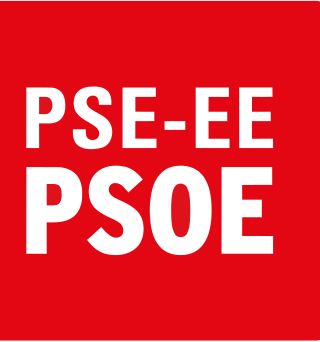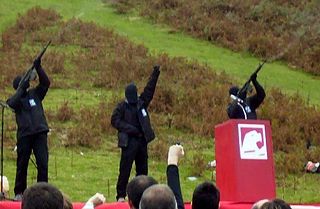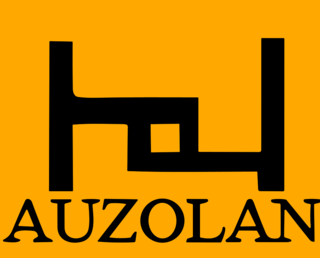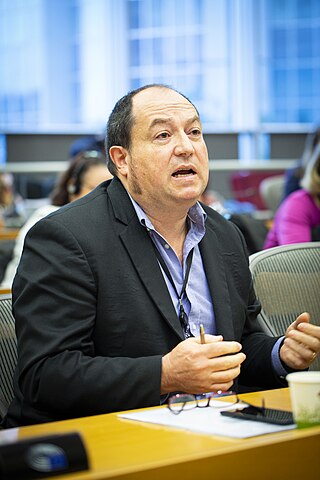Batasuna was a Basque nationalist political party. Based mainly in Spain, it was banned in 2003, after a court ruling declared proven that the party was financing ETA with public money.

Herri Batasuna was a far-left Basque nationalist coalition in Spain. It was founded in 1978 and defined itself as abertzale, left-wing, socialist, and supported the independence of the Greater Basque Country. It was refounded as Batasuna in 2001 and subsequently outlawed by the Spanish Supreme Court for being considered the political wing of the separatist group Euskadi Ta Askatasuna (ETA).
Abertzale is a Basque term usually referring to people or political groups who are associated with Basque nationalism.
Communist Movement of Euskadi was originally the branch of the Communist Movement (MC) in Basque Country and Navarre, Spain. EMK was previously known as ETA Berri, a splinter group of ETA. EMK separated itself from MC in 1983. In 1991 EMK merged with LKI and formed Zutik in Basque Country. In Navarre EMK took part in forming Batzarre. Some of its most prominent leaders were Patxi Iturrioz, Eugenio del Río, Rosa Olivares Txertudi, Milagros Rubio, Jesús Urra Bidaurre and the brothers Javier and Ignacio Álvarez Dorronsoro.

The Socialist Party of the Basque Country–Basque Country Left is a social-democratic political party in the Basque Country that acts as the regional affiliate of the Spanish Socialist Workers' Party (PSOE).
The Basque National Liberation Movement was an umbrella term that comprised all social, political and armed organizations orbiting around the ideas of the illegal armed organisation Euskadi Ta Askatasuna (ETA), proscribed internationally as a terrorist organisation.

People's Socialist Revolutionary Party was a non-legal Basque political party, considered commonly to be the political branch of ETA. It always ran as part of the coalition of the Basque National Liberation Movement, Herri Batasuna, until its self-dissolution in the 1990s. The party's acronym "HASI" means "to begin" in Basque language.

Askatasuna is a Basque political party registered on 31 August 1998, and outlawed in 2009 by the Spanish Audiencia Nacional under the 2002 Political Parties Law.

José Luis Álvarez Enparantza, better known by his pseudonym Txillardegi, was a Basque linguist, politician, and writer. He was born and raised in the Basque Country, and although he did not learn the Basque language until the age of 17, he later came to be considered one of the most influential figures in Basque nationalism and culture in the second half of the 20th century. He was one of the founders of ETA, but in 1967 he left because he did not agree with its political line.

The Basque conflict, also known as the Spain–ETA conflict, was an armed and political conflict from 1959 to 2011 between Spain and the Basque National Liberation Movement, a group of social and political Basque organizations which sought independence from Spain and France. The movement was built around the separatist organization ETA, which had launched a campaign of attacks against Spanish administrations since 1959. ETA had been proscribed as a terrorist organization by the Spanish, British, French and American authorities at different moments. The conflict took place mostly on Spanish soil, although to a smaller degree it was also present in France, which was primarily used as a safe haven by ETA members. It was the longest running violent conflict in modern Western Europe. It has been sometimes referred to as "Europe's longest war".

Santiago Brouard or Santi Brouard was a doctor and Basque politician. He was one of the leaders of Herri Batasuna, and deputy mayor of Bilbao. He was killed by the Spanish government's death squad, the Grupos Antiterroristas de Liberación (GAL), in one of its highest-profile acts. Broaurd was shot by GAL gunmen Luis Morcillo and Rafael López Ocaña as he left his paediatric clinic in Bilbao.
EH Bildu, short for Euskal Herria Bildu, is a left-wing, Basque nationalist and pro-independence a federation of political parties in Spain. It is the main political force of the abertzale left in Spain. EH Bildu is active in the Spanish Basque Country, that is, in the Basque Autonomous Community and Chartered Community of Navarre, as well as in the Treviño enclave of the Burgos Province. In the French Basque Country, it has an alliance with the party Euskal Herria Bai, with the goal of establishing a state for the Basque Country across the Spanish-French border.

Auzolan was a political coalition in the Southern Basque Country, created on 26 March 1983. It was a coalition between the Liga Komunista Iraultzailea (LKI), Langile Abertzale Iraultzaileen Alderdia and Nueva Izquierda, and had the support of the Communist Movement of Euskadi (EMK). The spokesperson of Auzolan was Bixente Serrano Izko.
Eusko Alderdi Sozialista was an underground revolutionary socialist Basque political party.
Euskal Herriko Alderdi Sozialista was an illegal revolutionary socialist Basque political party, with presence in both Spanish Basque Country and the French Basque Country.

Herriko Alderdi Sozialista was a revolutionary socialist Basque political party, with presence only in the French Basque Country.
Basque Socialist Party or Basque Socialist Assembly was a socialist Basque political party, with presence in the Southern Basque Country. The party was illegal until 1978.

Joxe Pernando Barrena Arza is a Basque politician, former member of the Parliament of Navarre and member of the European Parliament for Spain.
Jarki is an independentist and socialist organization from the Basque Country. It was founded on March 18, 2017, with the aim of engaging in ideological struggle. The organization seeks to promote confrontation with Spain by encouraging public mobilization and activism, with the goal of "eroding the state's hegemony." However, Jarki has explicitly rejected the use of street violence and attacks as a means to achieve its goals.
Socialist Movement is a separatist and socialist political movement in the Basque Country that emerged in the late 2010s. The Socialist Movement is composed of various organizations that are interconnected and share similar ideologies and tactics, with each organization focusing on a specific area of influence.











